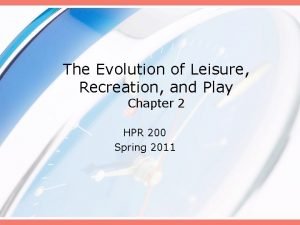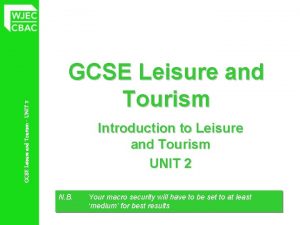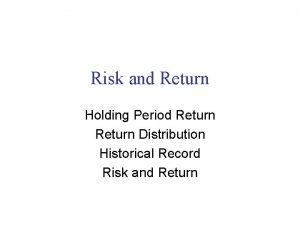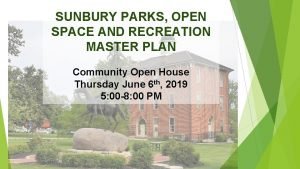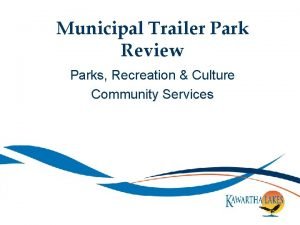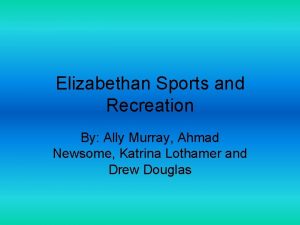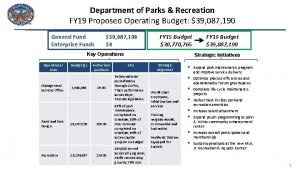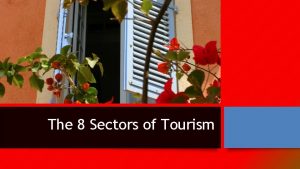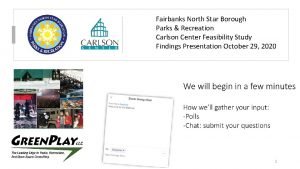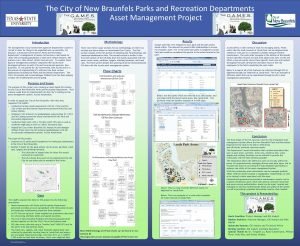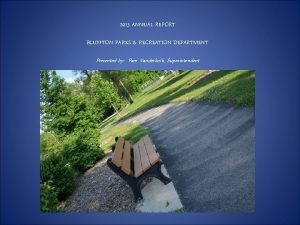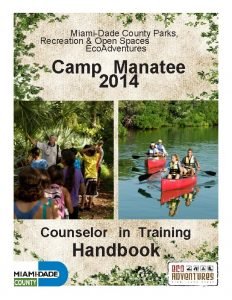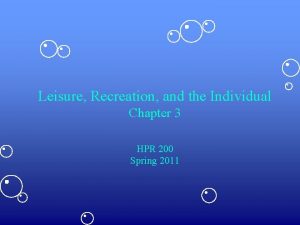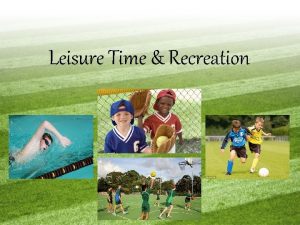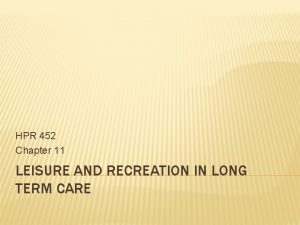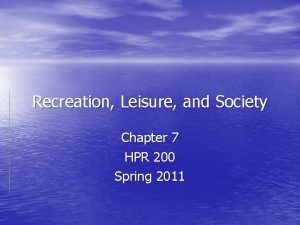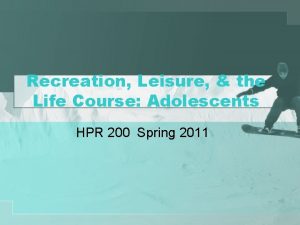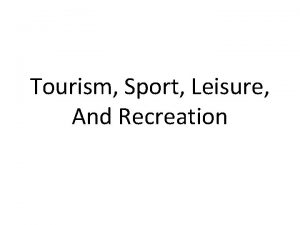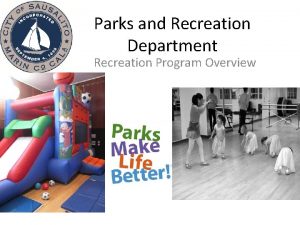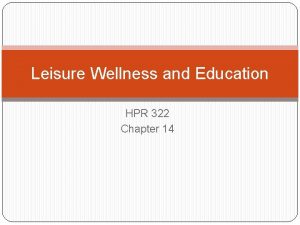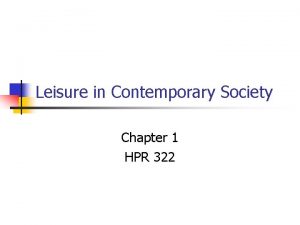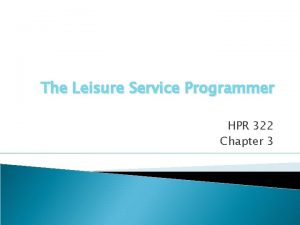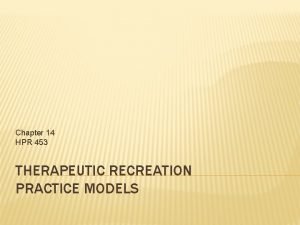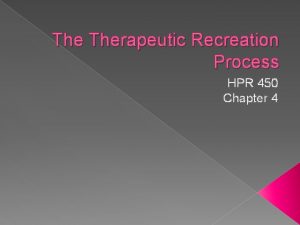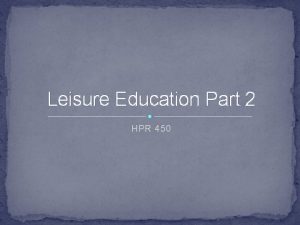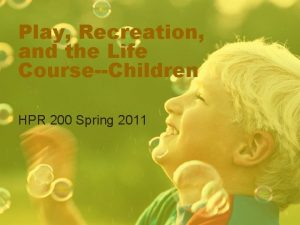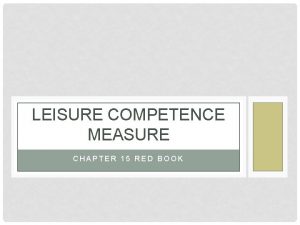Leisure Recreation and the Individual Chapter 3 HPR






















- Slides: 22

Leisure, Recreation, and the Individual Chapter 3 HPR 200 Spring 2011

Quiz • Name the major leisure contribution of the Mesopotamian culture. • Name the difference in Sabbath celebrations between the Ancient Israelites and Islam. • Name Aristotle’s three levels of leisure. • What did we learn about wealth and leisure?

Your Questions

Aspects of Leisure • • Physical Emotional Psychological Social

Physical Aspects of Leisure • Skill related components – Agility – Balance – Coordination – Power – Reaction time – Speed

Physical Fitness Skill Related Components - for athletes • Agility – change position quickly • Balance – regain upright posture and maintain equilibrium • Coordination – ability to use vision, touch, and muscle control in body movements • Power – strength • Reaction Time – time it takes to move after a decision is made • Speed – rate at which distance is covered Health Related Components -for athletes and non athletes • Cardiovascular Fitness – exercise at an elevated heart rate • Flexibility – ability to move joints and muscles to their fullest extent • Endurance – ability to exercise without tiring • Strength – ability to exert force against resistance • Body Composition – proportion of body fat to non-fat, should not exceed 20% (m) or 25% (f)

Interesting Facts about Fitness • In America, 25% of the population is completely Sedentary. • In America, 8 out of 10 over 25 are Overweight. • Rates range from 5% in Japan and China to 75% in Samoa. Even in China, major cities have rates as high as 20%. • FOR THE FIRST TIME EVER there are more fat people in the world than starving people.

Physical Aspects of Leisure • Nature vs Nurture • Health related components – Cardiovascular fitness – Flexibility – Endurance – Strength – Body composition

Physical Aspects of Leisure • Most popular – Exercise walking – Recreational swimming • Gender issues? ?

Emotional Aspects of Leisure • Satisfaction – Subjective – Sense of worth • Attitude – Past experience – Future experience • Values – Instrumental – Terminal

Emotional Aspects of Leisure • Preference to leisure activities are determined by satisfaction derived from, attitudes toward and values with respect to a specific activity. • Self-Actualization (remember Maslow? ) – Leisure provides a sensation of self determination and meeting your specific desires. • Flow – A concept you will hear more about in this class but in essence, it’s finding an activity that doesn’t bore you and doesn’t frustrate you.

Emotional/Psychological Benefits of Leisure • In many leisure activities learning is a benefit, intended or unintended. • New Behavior Learning – Camping teaches basic survival skills. • Memory Learning – Many leisure experiences are exercise for the mind. Studies have shown pattern recognition is universal. • Factual Learning – Learning for the sake of knowledge. How to grow veggies, how to cook, or how to build a craft are examples.

Psychological Effects of Leisure • • Abasement Autonomy Counteraction Deference Harm avoidance Justice Moral values • • Order Recognition Rejection Relaxation Self-control Task generalization Tolerance

Psychological Aspects of Leisure • Self-actualization – Maslow • Learning – – New behavior/skill Memory Facts Attitudes and values • Spirituality • Flow Self-Actualization Esteem Needs Belongingness & Love Needs Safety Needs Physiological Needs

Psychological Aspects of Leisure • Flow – Intense involvement – Matching skill and risk

Spiritual Aspects of Leisure • Spirituality usually connotes religion, and religion is an aspect or form of spirituality. It is not the only form or facet of it. • Your text suggests the following: – – – Enhanced personal development Greater appreciation for the wonders of nature Expanded social consciousness Sense of well being Pleasure of creativity

Quiz • Name 2 skill related components of leisure. • Name 2 emotional aspects of leisure. • How can leisure be spiritual?

Your Questions • Is any one of the four areas more important? • How does leisure help with the development of the mind for those that are physically and mentally challenged? • Can too much physical fitness have a negative outcome on one’s body? • How is “value” an emotional aspect of participation?

Social Aspects of Leisure • • • Socialization Age Gender Occupation Residence Lifestyle**

Social Benefits of Leisure • • • Socialization Need to belong Self-identity Bonding Friendships

Social Aspects of Leisure • Studies have shown the primary motivation for high school athletes to play sports is to develop relationships with teammates. • Age, Gender, Occupation, Geographic Location, and Lifestyles can all determine the social circles and leisure activities they choose. • The impact of Cocooning has impacted the social dynamic of leisure immensely in the last 40 years.

Leisure and Individuals with Disabilities • Individuals with physical disabilities • Individuals with cognitive disabilities • Individuals with emotional/behavioral disabilities • Older adults
 Evolution of leisure
Evolution of leisure Leisure and tourism gcse
Leisure and tourism gcse Real return formula
Real return formula Hpr talent
Hpr talent Family and morale welfare and recreation
Family and morale welfare and recreation Parks sunbury
Parks sunbury Parks and recreation trailer
Parks and recreation trailer Parks and recreation vision statement examples
Parks and recreation vision statement examples Management of park and recreation agencies
Management of park and recreation agencies Recreation and sports elizabethan era
Recreation and sports elizabethan era Parks and recreation organizational chart
Parks and recreation organizational chart Adventure and recreation sector in tourism industry
Adventure and recreation sector in tourism industry Fairbanks parks and recreation
Fairbanks parks and recreation City of los angeles department of recreation and parks
City of los angeles department of recreation and parks Parks and rec new braunfels
Parks and rec new braunfels Bluffton parks and recreation
Bluffton parks and recreation Department of sport and recreation wa
Department of sport and recreation wa Miami dade eco adventures
Miami dade eco adventures Mpumalanga department of culture sport and recreation
Mpumalanga department of culture sport and recreation Types of commercial recreation
Types of commercial recreation Harrisburg parks and recreation
Harrisburg parks and recreation Perks and rec
Perks and rec Food stands
Food stands
